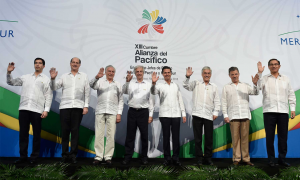By: Rafael Paz, 2L

(Members of both the Pacific Alliance and Mercosur meeting at Puerto Vallarta, Mexico at a jointly organized summit in July 2018. Source: https://www.latinfinance.com/web-articles/2018/7/pacific-alliance-and-mercosur-start-plans-for-free-trade-agreement)
It was the best of trade blocs, it was the worst of trade blocs. It was the age of free trade, it was the age of protectionism. Some trade blocs get a deal with the EU, some . . . don’t. Mercosur, the South American customs union comprised of Brazil, Argentina, Paraguay, and Uruguay, found itself in this very situation after Austria on September 19, 2019, and France on October 8, 2019, chose not to sign the Mercosur-EU trade deal due to Brazil’s controversial environmental policies. On the other hand, the Pacific Alliance, a South American trade bloc comprised of Chile, Mexico, Colombia, and Peru, recently announced its commitment to greater ties with the EU at an EU-Pacific Alliance summit meeting on September 25, 2019 with no EU-member nation voicing objections. With Brazil’s domestic policy driving away important Mercosur trade deals, it seems like Brazil is either knowingly or unknowingly sabotaging potential deals with other countries.
Established in 1991, the goal of the signatories of Mercosur was to “promote a common space that generates business and investment opportunities through the competitive integration of national economies into the international market.” However, in the almost thirty years since, Mercosur seems to be constraining opportunity, particularly that of Brazil. For example, Mercosur imposes on all its members common external tariffs that can be as high as 35% for certain goods. Because it has the highest GDP in South America, Brazil has great reason to feel stifled if these and other constraints continue at their current stature. The pressure on Brazil worsens when compared to what it stands to gain in a post-Mercosur universe. Some studies indicate that Brazil could receive an additional 1.25% bump to its annual GDP growth by moving beyond such high tariffs. Nevertheless, Brazil seems to have not completely dropped out of the bloc in recent years because of the potential of a future EU trade deal, which now seems dead for the time being.
On the other hand, the Pacific Alliance has everything to gain from remaining together. Not only does its founding treaty proclaim free trade and global economic integration as its objective, but it also actively searches for trade deals with the rest of the developed world. As of the summer of 2019, the Pacific Alliance expects to finalize an agreement that would bring Australia, Canada, New Zealand, and Singapore into the trade bloc as associate members. Indeed, the raw numbers alone indicate the success that the Pacific Alliance has achieved. Since its founding in 2011, its integration with global markets has skyrocketed, where exports to Asian markets comprise more than 30% of the exports of the member nations of Chile and Peru.
Given the vastly different outlooks that both trade blocs have for the future, it makes perfect sense why Brazil seems indifferent as to whether Mercosur acquires an EU trade deal at all. The only way that Brazil sees itself winning this game is if it chooses not to play.




